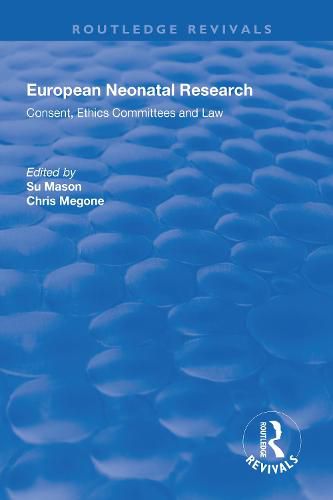Readings Newsletter
Become a Readings Member to make your shopping experience even easier.
Sign in or sign up for free!
You’re not far away from qualifying for FREE standard shipping within Australia
You’ve qualified for FREE standard shipping within Australia
The cart is loading…






This title was first published in 2001. An important book presenting the results of the European Union funded EURICON project in biomedical ethics. Involving experts in eleven countries, this project was motivated by European neonatal clinicians’ concerns about the problem of obtaining informed consent in neonatal research. It addressed the difficulties of obtaining consent from subjects involved in such research, and investigated the relevance and appropriateness of obtaining consent from parents. The project also examined the work of Research Ethics Committees in Europe. It explored their responses to EURICON’s analysis of the views of clinicians and parents, and their attitudes towards the relevant laws and legal requirements. The wide geographical scope of the project enabled international comparisons of the opinions of clinicians and parents, the legal frameworks governing neonatal research, and the effectiveness of Research Ethics Committees. This is the first such investigation on a European scale, and it offers a unique interdisciplinary approach to these issues. Incorporating clinical, ethical, legal and sociological perspectives, the results and recommendations presented in this book will be of widespread significance to practitioners, researchers and policy makers throughout Europe and beyond.
$9.00 standard shipping within Australia
FREE standard shipping within Australia for orders over $100.00
Express & International shipping calculated at checkout
This title was first published in 2001. An important book presenting the results of the European Union funded EURICON project in biomedical ethics. Involving experts in eleven countries, this project was motivated by European neonatal clinicians’ concerns about the problem of obtaining informed consent in neonatal research. It addressed the difficulties of obtaining consent from subjects involved in such research, and investigated the relevance and appropriateness of obtaining consent from parents. The project also examined the work of Research Ethics Committees in Europe. It explored their responses to EURICON’s analysis of the views of clinicians and parents, and their attitudes towards the relevant laws and legal requirements. The wide geographical scope of the project enabled international comparisons of the opinions of clinicians and parents, the legal frameworks governing neonatal research, and the effectiveness of Research Ethics Committees. This is the first such investigation on a European scale, and it offers a unique interdisciplinary approach to these issues. Incorporating clinical, ethical, legal and sociological perspectives, the results and recommendations presented in this book will be of widespread significance to practitioners, researchers and policy makers throughout Europe and beyond.